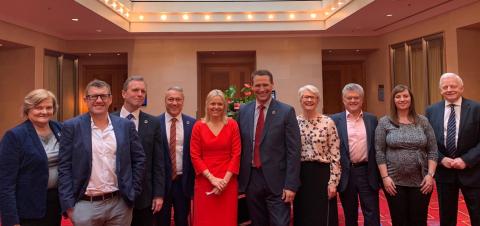The recent Global Water Summit held in London was a great opportunity to hear about the key issues occupying water utilities from around the world. Central to the challenges faced internationally were water scarcity and environmental degradation, with population growth and climate change as primary drivers of these challenges. The Conference brings together Executives from water utilities with industry providers to explore the contemporary issues faced by the water sector and the potential innovations that can help navigate the future.
I must say that, while it is clear there are a number of challenges being faced across different jurisdictions, one gets the overall sense that the sector is rising to these challenges and indeed embracing the opportunity of doing things differently to ensure continued provision of high-quality water and sanitation services, and perhaps an expanded role for water utilities in the lives of customers and communities.
While in Australia we are primarily concerned with a drying and warming climate, our peers are also dealing with a drying climate (in some parts) as well as flooding and extreme weather events like the “beast from the east” cold snap that severely affected water and sewerage services in the UK last year. I’m always impressed by the water sector’s ability to navigate these challenges successfully, and this was reinforced in my discussions with international water utilities.
A number of European utilities are taking their environmental performance to the next level, with a focus on “swimability” (not sure if that’s a real word!) of iconic rivers such as the Seine and the Spree. There is also a strong emphasis on blue/green infrastructure, smart cities (there is a huge shift to digital taking place) and a growing appreciation of the liveability aspects of water and sanitation services.
On this last point I was a little struck (and proud) of the fact that the Australian water utilities have for some time been focusing on health and well-being as central to our role and that a number of jurisdictions (especially the UK) are looking to Australia in terms of exploring the role water utilities play in local communities and how this relates to having a “social licence to operate”. It is clear, at least in the UK, that the political environment (if I had a dollar/pound for every time I heard the word Brexit....) is complex and playing out in terms of stakeholder and regulator pressure across a range of fronts. The UK water regulator for price and service is deeply, deeply involved in assessing and approving water utility plans – to the extent that it takes nearly 4 years to prepare a price submission for a 5-year period, as well as significant investment on “the consulting cottage industries that have sprung up to support the process”.
A distinction was obvious between where the Australian water sector is in terms of collaboration, and where the UK water sector is placed (having been privatised for 30 years). In the current environment, the UK water utilities are recognising the need to collaborate effectively to improve overall industry performance, and I think they consider the Australian example (where we openly share innovations, collaborate on policy advocacy and benchmark ourselves) as worthwhile pursing. Our collective stand for the SDGs is a good example of this.
Speaking of collaboration, another highlight at the Summit was the launch of the World Water Innovation Fund to deploy advanced technologies which will benefit 50 million people.
The unique concept behind the fund is that utilities in the UK, the US, Brazil and Australia will dedicate not only money, but expertise to undertake research and large-scale technology trials as part of a collaborative effort to mitigate the effects of climate change and population growth on water resource availability.
The initial utilities involved are Severn Trent and United Utilities (UK); LADWP and DC Water (US); Aegea Saneamento (Brazil); and Hunter Water, Melbourne Water, Yarra Valley Water, South East Water and City West Water (all Australia). As a first step, the fund will support live technology trials to tackle the problem of leakage.

